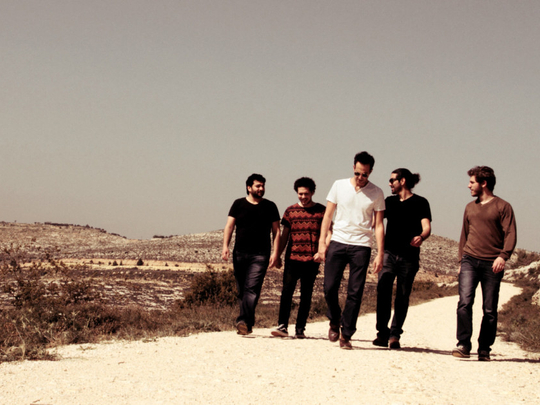
Palestine-based rock band Apo & the Apostles released their latest EP Ya Zalamez last week, a four-track effort that is as charming as it is listenable. Bandora Blues, Albi, Haji and Dani Ya Dani blend salsa, pop, rock and traditional eastern influences masterfully all in less than 17 minutes.
“We have this foolish idea to pioneer a new genre of rock that relates to dancing and moving,” vocalist and guitarist Apo Sahagian told Gulf News tabloid!. “So we try out many genres, from soft rock to pop rock to blues, but the aim is always the same: to make the listener move.”
Ya Zalamez succeeds on that front. It marks the band’s fourth EP since they formed in 2013, and their first release under Universal Music MENA. The EP is sung exclusively in Arabic, unlike the band’s previous efforts that included English, French, and Armenian.
EP opener Bandora Blues sounds illicit and rhythmic, while Albi (ft Norah Shaqur) takes the album to a more pensive space with a melody that wouldn’t sound out of place on a K-pop ballad. The third track, Haji, brings crude Arabic slang delightfully to the forefront, while EP closer Dani Ya Dani finds a middle ground between the dreamy and dance-y.
ACROSS THE UNIVERSE
“Our goal is to tour the world and get more people on our band wagon. And it’s not just for us, but for other bands in [Occupied] Jerusalem and Bethlehem,” said Sahagian.
“Let’s say if we were to make it to those great musical events and festivals in Europe and the US — [the] Grammy’s for instance — that would mean a lot for our crowd back home and it would boost and energise the arts scene there because they would see that a path had been set,” he added.
When it comes to external inspirations, each member of Apo & the Apostles — Karim Morcos (guitar), Pierre Taweel (drums), Firas Harb (trumpet, vocals) and Amir Handal (bass) — looks in a different direction.
“Karim is going to jump to the Rolling Stones and blues. Pierre is most definitely a Johnny Cash aficionado. Firas and Amir are into the psychedelic stuff, and I’m into the alternative folk music,” said Sahagian.
Their attempt to create something all-Arabic for the first time didn’t result in any obvious hiccups. The band’s next effort, however, will be a full-length English debut in September.
“From day one, it was all in English since neither I, Karim, nor our former bassist Joel are native Arabic speakers,” said Sahagian. Sahagian primarily writes in English and his native Armenian.
“I don’t know if people realise it, but not only do I sing with an accented Arabic but also the words tend to be easy and not as loaded as the lyrics of other regional artists,” he said.
SET THE BAR
Apo & the Apostles are part of a bigger movement of alternative rock acts making themselves heard in the Middle East. Sahagian believes audiences have set the bar high in terms of the quality they’ve come to expect.
“[Jordanian rock band] El Moraba3’s first release is a must; [Lebanese band] Mashrou Leila’s first release was pioneering, as well. Then you have [Lebanese duo] The Wanton Bishops that could effortlessly take over any garage band coming out of America,” he said.
Signing with Universal Music MENA hasn’t been a fix-all or an instant boost into the big leagues for the band, but it has given them a leg-up in terms of credibility, distribution, marketing and mobility.
“We’re just waiting for them to invite us to a Universal Music party with Justin Bieber and Taylor Swift,” said Sahagian.
“But besides that, we still self-manage, which is a great challenge, since we have to contact festivals and organisers ourselves without having much experience or network in the industry. So our next obstacle to overcome is management.”
*Listen to Ya Zalamez on Apple Music, Deezer or Anghami now.












